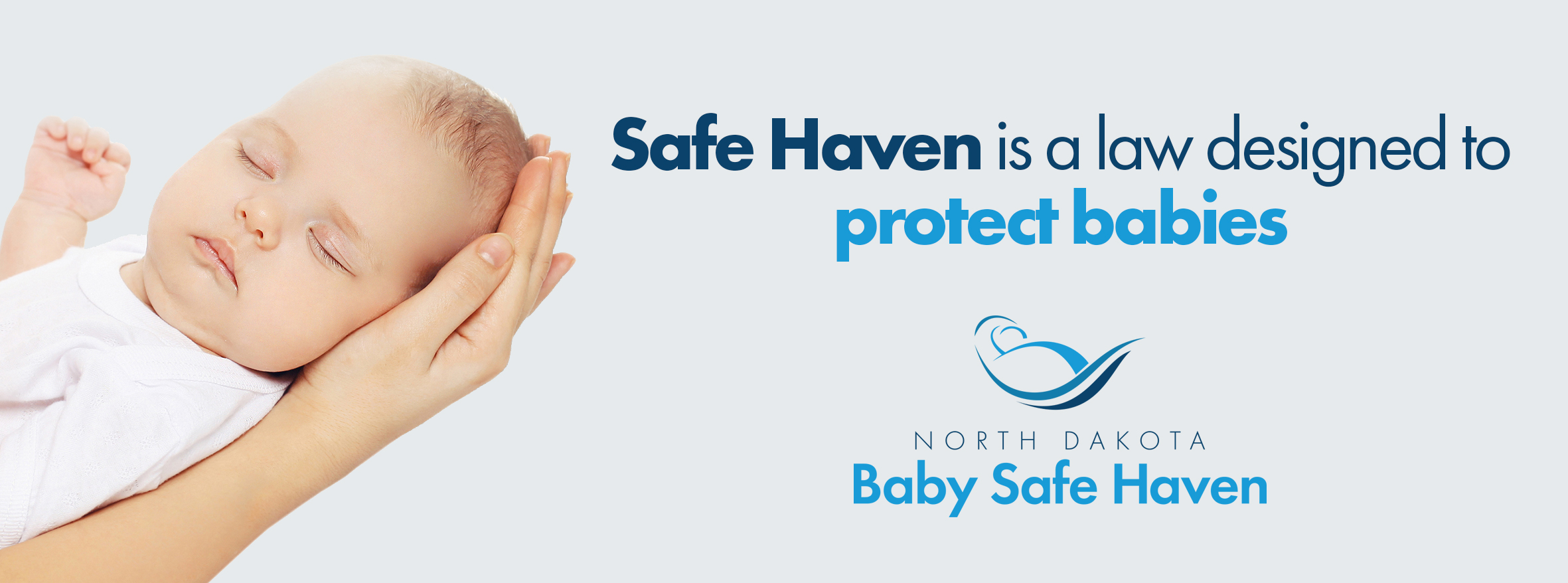
What is the Baby Safe Haven Law?
The Baby Safe Haven Law allows for a parent or parent’s agent (another person acting with the parent’s consent), who feel they are unable to take care of their baby, to surrender the baby without facing prosecution for abandonment.
To be protected by the Baby Safe Haven Law, the baby must be unharmed, under one year of age, and surrendered to an on-duty staff person working for a Baby Safe Haven-approved location.
Parents are protected under the Baby Safe Haven Law if all four of the following criteria are met:
The baby is unharmed
The baby is under one year of age
The baby is left at an approved location
The baby is given to an on-duty staff member
Frequently Asked Questions
Will the parent or parent's agent surrendering the baby be anonymous?
If a parent chooses to leave the baby in the hospital after giving birth there, the Baby Safe Haven Law cannot assure complete anonymity because the hospital will have some information about the baby and family. If a baby is taken to an approved location after the birth, the Baby Safe Haven Law protects the parent/agent's anonymity.
What are the approved locations to leave a baby?
The following are approved Baby Safe Haven locations in North Dakota:
- The hospital where the baby was born
- Hospital/Emergency Rooms
- Local Public Health Units
- Human Service Zones
- Law Enforcement Centers
- Regional Human Service Centers
- Long Term Care Nursing Facilities
- Children’s Advocacy Centers
- 911 EMS Responders
The ND Century Code (50-25.1-15) was amended to authorize the installation of newborn safety devices (Safe Haven Baby Boxes), effective August 1, 2025. However, none have currently been installed in North Dakota.
"Newborn safety device" means a device that is: (1) Physically part of the building at an approved location; (2) Staffed twenty-four hours a day seven days a week; (3) Temperature-controlled and ventilated for the safety of newborns; (4) Equipped with a functional alarm system which automatically triggers an alarm inside the building when an infant is placed in the device; and (5) Located in a manner that the interior point of access is in an area that is conspicuous and visible to the employees of the approved location.
DISCLAIMER: Please note that the status of newborn safety devices (Safe Haven Baby Boxes) can change at any time. Installations may occur without prior public notice; therefore, it's recommended to check the North Dakota Health & Human Services' Baby Safe Haven webpage for the most current information.
What will happen to the baby after it is surrendered?
A health care provider’s visit will take place to make sure the baby is healthy and has not been harmed. The social service agency will be called to care for the baby and to start looking for a safe and permanent home.
When a baby is left at a hospital following a birth, the hospital may already have some information, such as the names of other relatives including the other parent; these people will be contacted to try to find a permanent home for the baby. By law, the social service agency cannot contact or try to find the parent or the person who surrendered the baby.
When the baby has known tribal affiliation, the Indian Child Welfare Act (ICWA) applies and the affiliated tribe will be notified and may have jurisdiction.
If there are no suitable or willing relatives to adopt the baby, the social service agency will look for another permanent family. A court hearing will be scheduled to terminate the legal rights of both birth parents so the baby can be adopted. Notice of these hearings is published in the county’s newspaper. Once parental rights are terminated, birth parents will no longer be the legal parents. This means that they will not be able to make decisions about the baby and the baby can be adopted.
What happens if someone decides later that they want their baby back?
An individual who later decides they want their baby back should contact the Human Service Zone Offices (county social services) in their area: http://www.nd.gov/dhs/locations/countysocialserv/ or call the Safe Haven Hotline, 24/7 at 1-888-510-BABY (2229) or Text SAFEHAVEN to 313131.
It is important to contact one of these entities as soon as possible, because after legal rights are terminated, re-unification may not be possible.
Are there situations where the Baby Safe Haven Law does not protect the parent or parent's agent?
If a baby is left anywhere other than with an on-duty employee of an approved safe location, the Baby Safe Haven Law does not apply, and law enforcement will be called. If the baby shows signs of harm, the Baby Safe Haven Law does not apply and there will be an investigation to determine how the baby was harmed.
Is there help to decide what to do?
Yes, there is help available.
The national Safe Haven Hotline is available 24/7 at 1-888-510-BABY (2229) to provide referrals for local help.
• If someone is considering adoption, adoption agencies are available to discuss options http://www.nd.gov/dhs/services/childfamily/adoption/agencies.html
• For someone experiencing a crisis pregnancy, help is available by calling the Women’s Care Center at 1-877-908-2341 or by visiting: https://www.womenscarecenter.org/
• Additional community resources are available by calling 2-1-1 or at First Link: https://myfirstlink.org/.
